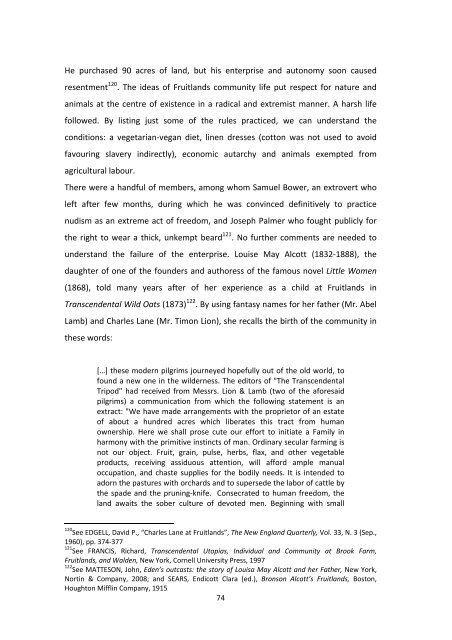building the american landscape - Univerza v Novi Gorici
building the american landscape - Univerza v Novi Gorici
building the american landscape - Univerza v Novi Gorici
You also want an ePaper? Increase the reach of your titles
YUMPU automatically turns print PDFs into web optimized ePapers that Google loves.
He purchased 90 acres of land, but his enterprise and autonomy soon caused<br />
resentment 120 . The ideas of Fruitlands community life put respect for nature and<br />
animals at <strong>the</strong> centre of existence in a radical and extremist manner. A harsh life<br />
followed. By listing just some of <strong>the</strong> rules practiced, we can understand <strong>the</strong><br />
conditions: a vegetarian‐vegan diet, linen dresses (cotton was not used to avoid<br />
favouring slavery indirectly), economic autarchy and animals exempted from<br />
agricultural labour.<br />
There were a handful of members, among whom Samuel Bower, an extrovert who<br />
left after few months, during which he was convinced definitively to practice<br />
nudism as an extreme act of freedom, and Joseph Palmer who fought publicly for<br />
<strong>the</strong> right to wear a thick, unkempt beard 121 . No fur<strong>the</strong>r comments are needed to<br />
understand <strong>the</strong> failure of <strong>the</strong> enterprise. Louise May Alcott (1832‐1888), <strong>the</strong><br />
daughter of one of <strong>the</strong> founders and authoress of <strong>the</strong> famous novel Little Women<br />
(1868), told many years after of her experience as a child at Fruitlands in<br />
Transcendental Wild Oats (1873) 122 . By using fantasy names for her fa<strong>the</strong>r (Mr. Abel<br />
Lamb) and Charles Lane (Mr. Timon Lion), she recalls <strong>the</strong> birth of <strong>the</strong> community in<br />
<strong>the</strong>se words:<br />
[…] <strong>the</strong>se modern pilgrims journeyed hopefully out of <strong>the</strong> old world, to<br />
found a new one in <strong>the</strong> wilderness. The editors of "The Transcendental<br />
Tripod" had received from Messrs. Lion & Lamb (two of <strong>the</strong> aforesaid<br />
pilgrims) a communication from which <strong>the</strong> following statement is an<br />
extract: "We have made arrangements with <strong>the</strong> proprietor of an estate<br />
of about a hundred acres which liberates this tract from human<br />
ownership. Here we shall prose cute our effort to initiate a Family in<br />
harmony with <strong>the</strong> primitive instincts of man. Ordinary secular farming is<br />
not our object. Fruit, grain, pulse, herbs, flax, and o<strong>the</strong>r vegetable<br />
products, receiving assiduous attention, will afford ample manual<br />
occupation, and chaste supplies for <strong>the</strong> bodily needs. It is intended to<br />
adorn <strong>the</strong> pastures with orchards and to supersede <strong>the</strong> labor of cattle by<br />
<strong>the</strong> spade and <strong>the</strong> pruning‐knife. Consecrated to human freedom, <strong>the</strong><br />
land awaits <strong>the</strong> sober culture of devoted men. Beginning with small<br />
120 See EDGELL, David P., “Charles Lane at Fruitlands”, The New England Quarterly, Vol. 33, N. 3 (Sep.,<br />
1960), pp. 374‐377<br />
121 See FRANCIS, Richard, Transcendental Utopias, Individual and Community at Brook Farm,<br />
Fruitlands, and Walden, New York, Cornell University Press, 1997<br />
122 See MATTESON, John, Eden’s outcasts: <strong>the</strong> story of Louisa May Alcott and her Fa<strong>the</strong>r, New York,<br />
Nortin & Company, 2008; and SEARS, Endicott Clara (ed.), Bronson Alcott’s Fruitlands, Boston,<br />
Houghton Mifflin Company, 1915<br />
74
















